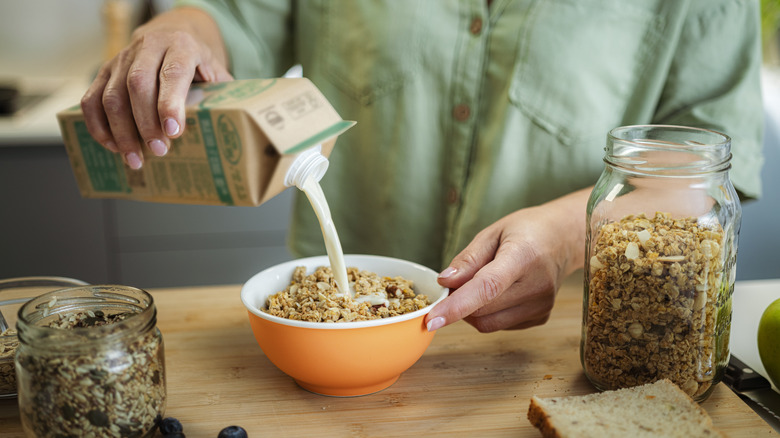Is Boxed Milk Good For You? What To Consider
In today's busy world, we all crave convenience. One such convenient option is boxed milk, also known as "shelf-stable milk." You might wonder whether or not it is safe to drink boxed milk. The answer is yes; just like traditional milk, boxed milk is pasteurized to keep it free of harmful bacteria and safe to consume (via Dairy Discovery Zone). However, whether it's the right choice for you depends on your personal preferences and lifestyle.
Boxed milk has unique benefits like an extended shelf life, reduced refrigeration requirements, and environmentally friendly packaging. But is it as nutritious as its chilled counterpart? What are the trade-offs between convenience and health? Are there any downsides to this seemingly perfect solution for our busy lives? By looking into the production process, nutritional aspects, and potential benefits or drawbacks of choosing boxed milk, you can decide if it's the right choice for you and your loved ones. So, pour yourself a glass and explore how shelf-stable milk could affect your health and lifestyle.
The unique production process of boxed milk
Boxed milk has a unique production process that distinguishes it from refrigerated milk. The process begins with pasteurization, which is a crucial step in ensuring the product's safety for consumption. The milk undergoes high-temperature pasteurization to eliminate harmful bacteria and pathogens, making it a safe and healthy option for drinking (via the American Dairy Association North East). After pasteurization, the milk is rapidly cooled and packaged in aseptic containers designed to prevent light, air, and microorganisms from entering (via Dairy Foods). This packaging ensures that the milk remains fresh and nutritious longer, unlike traditional dairy products that require a continuous cold chain to maintain their integrity.
The extended shelf life of boxed milk is one of its most significant advantages. Unlike regular milk, which has a limited shelf life and often spoils quickly, boxed milk can be stored unrefrigerated for up to nine months without spoiling (via Organic Valley). This extended shelf life is especially beneficial for those living in areas with unreliable access to fresh milk or anyone seeking a long-lasting dairy product for emergencies or convenience.
Nutritional considerations and advantages of boxed milk
One of the primary concerns when considering boxed milk as an alternative to traditional fresh milk is its nutritional content. Both types are comparable in terms of macronutrient content (via Dairy Discovery Zone). While there may be slight variations in taste and texture due to the aseptic packaging process (via Tetra Pak), boxed milk has several advantages over fresh milk.
One of the most significant advantages of boxed milk is its ability to retain vitamins and minerals. The aseptic packaging process prevents nutrients from being degraded by light and air, potentially leading to better retention of certain nutrients. A 2018 study in Innovative Food Science & Emerging Technologies found that high-pressure homogenization (HPH or UHPH) can also help to preserve the nutritional qualities of milk, such as riboflavin, vitamin C, and antioxidant capacity.
As far as additives and preservatives, it is a good idea to read the label of any boxed milk product. While some manufacturers may add stabilizers or emulsifiers to improve texture or shelf life and vitamin fortification may occur to compensate for any nutrient loss during processing, these additives are generally safe.
Maintaining the freshness and safety of aseptic milk
When it comes to milk, ensuring its safety and freshness is of the utmost importance, regardless of whether it comes in a box or a traditional container. Thankfully, both types of milk undergo pasteurization; but, once you open an aseptic milk carton, it's essential to follow some guidelines to maintain its freshness and safety.
Aseptic milk has an impressive shelf life; but, once you open it, it's crucial to refrigerate it immediately to maintain its freshness. Leaving the milk unrefrigerated can lead to spoilage, and every hour above 45 degrees Fahrenheit results in a loss of freshness by a day (via Dairy Discovery Zone). Store your milk in the coldest part of the fridge at around 33-40 degrees to keep it fresh and tasty (via the American Dairy Association North East). It will also taste better if you refrigerate it before serving.
For the best taste and quality, consuming the milk within seven days of opening is recommended. Also, be sure to store the milk away from strong-smelling foods, as milk can easily absorb odors from its surroundings (via Dairy Farmers of Canada). Following these simple guidelines allows you to enjoy the safe, fresh, and delicious flavor whenever you're craving milk.




